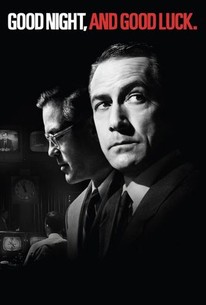The movie Good Night, and Good Luck (2005) gained its title from Ed Murrow's broadcast segment's closing phrase. Murrow would show his news and allowed for extended conversation. Almost always, Murrow closed his segment with "Good night, and good luck."
Early on in the movie, it's obvious that there's a conflict between the press and the McCarthy-era government. Murrow, as a member of the press, constantly challenges the government while the government constantly tries to silence him.
Funny enough, in one of the segments where Murrow was speaking at an event, he said, "Our history will be what we make of it."
At the time, Joseph McCarthy and his council had over 200 people accused of being Communists or Communist sympathizers. This wave of panic, or McCarthyism, is also known as one of the major Red Scares.
One of the people accused of Communism was from a Michigan Air Base. Air Force Lieutenant Milo Radulovich was accused and indicted as a Communist without a hearing or trial. His biggest crime, as Murrow soon reported, was that he was of Serbian descent through his father.
No one knew his actual crimes. His charges were in a missing confidential folder that was who-knew-where. Even the military were trying to cover up the story.
Regardless of military intimidation or claims of "security risk," Murrow consistently reported on the Radulovich story. Other members of the press avoided the story of the lieutenant or McCarthyism to avoid being accused themselves or visited by military men.
The government was in almost complete control of the media.
It's not that different today, just in a new form of persecution and prosecution.
Murrow's own boss at CBS warned Murrow to back off the McCarthy stories. He believed that Joseph McCarthy's witch hunt of alleged communists would implode on himself. McCarthy stories were chaos and risky to broadcast but Murrow insisted.
 |
| Edward R. Murrow. Image from Britannica. |
Murrow still reported.
After early reports, the reportage on McCarthyism and the trials conducted became a matter of ethics and legality. Ethically, the story was well-done. Legally, lawyers warned and suggested killing the stories.
One of the Murrow broadcasts CBS and their lawyers caught and tried to kill was when Murrow began to challenge McCarthy directly... by using his own words against him. It evolved into an accusatory game of I-beat-you-to-it.
McCarthy soon started attacking Murrow. He claimed that Murrow was connected to the communist party.
A quote that stuck out to me from Murrow regarding McCarthy's accusations was "An accusation is not proof."
Both men were under a constant barrage of accusations and opinions. Approvals from other media outlets changed the mood of a whole room. Bad news for one party elated the other, as displayed as when Lt. Radulovich was reinstated to his position in the Air Force.
Life went on for most of those depicted.
Journalists in the film were stunned for a moment between Murrow's reenacted broadcasts. Notable journalist Don Hollanback's death was announced shortly after the lieutenant's reinstatement. He'd passed from suicide by gas released from his stove.
Almost as if to match that loss, the U.S Senate grew tired of McCarthy almost as much as Murrow "enjoyed" broadcasting his interactions against the junior senator. The Senate moved to investigate McCarthy (which didn't do much as McCarthy was forced to quiet himself, almost vanishing for the remainder of his time as senator).
In a twisted way, the recreation of the Murrow-McCarthy feud and McCarthy's incitement of a Red Scare was a haunting reflection of today's journalist-politician interaction and politician's exaggerations of current issues.
Everyone half-wins.
Then, McCarthy lost his significant position as bold anti-communist senator (but still held some form of power by giving paranoia to the American people), major figures in the United States at the time were confronted, and Murrow got the last word at an awards ceremony.
Today, a man which holds no political power still has a massive following with xenophobic or extreme views), major figures in both politics and journalism are constantly under the careful eye of the public (many being new young voters) or in conflict, and journalists still receive recognition, positive or not.
Much like Murrow was describing, it's a tricky world to navigate. It's up to the people to keep figures, like those in the government, in check.
So, as Murrow says,"Good night... and good luck."


No comments:
Post a Comment